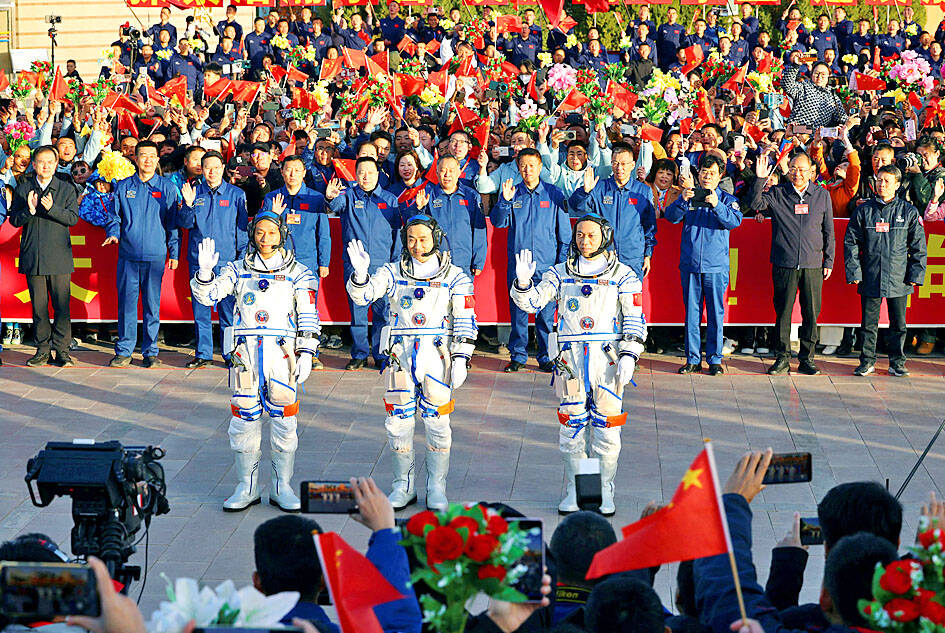China yesterday successfully launched a rocket to send a team of three astronauts to the nation’s space station.
The Shenzhou 17 blasted off at 11:14am, state broadcaster China Central Television reported.
The launch comes shortly after a top Chinese scientist outlined the nation’s space goals for the next 15 years, including a mission to send Chinese astronauts to the moon for the first time.

Photo: Reuters
During a speech on Sunday Wu Weiren (吳偉仁), chief designer of China’s lunar exploration program, also accused the US of trying to hinder the development of China’s space program.
“China’s deep space exploration is facing serious challenges marked by a blockade and isolation from the US-led West, which is comparable with the suppression the country’s suffering from in the chip industry,” the Global Times quoted him as saying.
China aims to become the first nation to have a spacecraft return to Earth with samples from the far side of the moon next year, Wu said.
Other projects include a robotic probe to the lunar south pole, as well as a crewed mission “around 2030.”
NASA Administrator Bill Nelson has frequently spoken about the threat posed to the US by China in space, warning that Beijing might seek to get to the lunar south pole first and prevent other countries from accessing resources there.
China “has never sought hegemony in space,” China Manned Space Agency Director Lin Xiqiang (林西強) said on Wednesday, adding that the country is ready to invite astronauts from other countries to participate in its space program.
The three astronauts on the mission are Tang Hongbo (湯洪波), who was part of the Shenzhou 12 crew, Tang Shengjie (唐勝傑) and Jiang Xinlin (江新林).
The astronauts are to work in the Tiangong space station for six months and return in April, according to the briefing.
China last launched a crewed rocket to its space station on May 30, when the Shenzhou 16 spaceship sent three astronauts, including veteran Jing Haipeng (景海鵬) and scientist Gui Haichao (桂海潮).
During their time in space, they conducted a spacewalk and held a public lecture for Chinese students.
The Shenzhou 16 crew members are scheduled to return to Earth on Tuesday next week.

ANGER: A video shared online showed residents in a neighborhood confronting the national security minister, attempting to drag her toward floodwaters Argentina’s port city of Bahia Blanca has been “destroyed” after being pummeled by a year’s worth of rain in a matter of hours, killing 13 and driving hundreds from their homes, authorities said on Saturday. Two young girls — reportedly aged four and one — were missing after possibly being swept away by floodwaters in the wake of Friday’s storm. The deluge left hospital rooms underwater, turned neighborhoods into islands and cut electricity to swaths of the city. Argentine Minister of National Security Patricia Bullrich said Bahia Blanca was “destroyed.” The death toll rose to 13 on Saturday, up from 10 on Friday, authorities

Two daughters of an Argentine mountaineer who died on an icy peak 40 years ago have retrieved his backpack from the spot — finding camera film inside that allowed them a glimpse of some of his final experiences. Guillermo Vieiro was 44 when he died in 1985 — as did his climbing partner — while descending Argentina’s Tupungato lava dome, one of the highest peaks in the Americas. Last year, his backpack was spotted on a slope by mountaineer Gabriela Cavallaro, who examined it and contacted Vieiro’s daughters Guadalupe, 40, and Azul, 44. Last month, the three set out with four other guides

Local officials from Russia’s ruling party have caused controversy by presenting mothers of soldiers killed in Ukraine with gifts of meat grinders, an appliance widely used to describe Russia’s brutal tactics on the front line. The United Russia party in the northern Murmansk region posted photographs on social media showing officials smiling as they visited bereaved mothers with gifts of flowers and boxed meat grinders for International Women’s Day on Saturday, which is widely celebrated in Russia. The post included a message thanking the “dear moms” for their “strength of spirit and the love you put into bringing up your sons.” It

DISASTROUS VISIT: The talks in Saudi Arabia come after an altercation at the White House that led to the Ukrainian president leaving without signing a minerals deal Ukrainian President Volodymyr Zelenskiy was due to arrive in Saudi Arabia yesterday, a day ahead of crucial talks between Ukrainian and US officials on ending the war with Russia. Highly anticipated negotiations today on resolving the three-year conflict would see US and Ukrainian officials meet for the first time since Zelenskiy’s disastrous White House visit last month. Zelenskiy yesterday said that he would meet Saudi Arabian Crown Prince Mohammed bin Salman, the nation’s de facto leader, after which his team “will stay for a meeting on Tuesday with the American team.” At the talks in the Red Sea port city of Jeddah, US